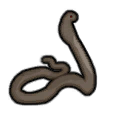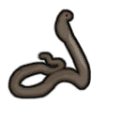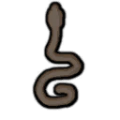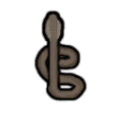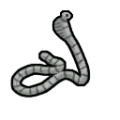Difference between revisions of "Cobra"
m (→Analysis: minor grammar) |
|||
| Line 51: | Line 51: | ||
== Analysis == | == Analysis == | ||
| − | In a tropical biome, cobras are a persistent threat to your small [[animal]]s, [[children]],{{BiotechIcon}} and possibly unarmed adults. When fighting a single cobra, its toxic bite is unlikely to make a difference, at least with adult colonists. However, the toxins can add up when fighting a [[manhunter pack]] of cobras. It can also matter when a cobra fights smaller targets. | + | In a tropical biome, cobras are a persistent threat to your small [[animal]]s, [[children]],{{BiotechIcon}} and possibly to unarmed adults. When fighting a single cobra, its toxic bite is unlikely to make a difference, at least with adult colonists. However, the toxins can add up when fighting a [[manhunter pack]] of cobras. It can also matter when a cobra fights smaller targets. |
There's not much reason to tame a cobra, or keep a tamed cobra. Cobras cannot be trained to attack, and even if you use [[allowed area]]s to force a cobra to fight, it is one of the weakest predators in the game. In the tropics, you have access to [[elephant]]s. Elephants are one of the strongest animals in the game, can be trained to attack, can graze on grass, and are just as easy to tame. In addition, elephants will not go manhunter on a failed taming attempt. For meat, [[tortoise]]s are strictly better. | There's not much reason to tame a cobra, or keep a tamed cobra. Cobras cannot be trained to attack, and even if you use [[allowed area]]s to force a cobra to fight, it is one of the weakest predators in the game. In the tropics, you have access to [[elephant]]s. Elephants are one of the strongest animals in the game, can be trained to attack, can graze on grass, and are just as easy to tame. In addition, elephants will not go manhunter on a failed taming attempt. For meat, [[tortoise]]s are strictly better. | ||
Revision as of 06:56, 20 April 2023
Cobra
A large predatory snake. Cobras can be highly aggressive if provoked, and their bite injects toxic venom into the victim.
Base Stats
- Type
- Animal
- Flammability
- 70%
Pawn Stats
- Move Speed
- 3.5 c/s
- Health Scale
- 50% HP
- Body Size
- 0.25
- Mass - Baby
- 3 kg
- Mass - Juvenile
- 7.5 kg
- Mass - Adult
- 15 kg
- Carrying Capacity
- 19 kg
- Filth Rate
- 1
- Hunger Rate
- 0.11 Nutrition/Day
- Diet
- carnivorous and ovivorous
- Life Expectancy
- 20 years
- Manhunter Chance
- 50%
- Manhunter Chance (Taming)
- 10%
- Trainable Intelligence
- None
- Wildness
- 75%
- Minimum Handling Skill
- 7
- Mate Interval
- 12 hours
- Maturity Age
- 0.5 years (30 days)
- Juvenile Age
- 0.15 years (9 days)
- Comfortable Temp Range
- 0 °C – 60 °C (32 °F – 140 °F)
Production
- Meat Yield
- 36
 cobra meat
cobra meat - Leather Yield
- 18
 lizardskin
lizardskin - Eggs Per Clutch
- 1 to 2
- Egg Laying Interval
- 10 days
- Can Lay Unfertilized Eggs
- false
Melee Combat
- Attack 1
- Mouth
12 dmg (Toxic bite)
18 % AP
2 second cooldown
Stun for 280 ticks (4.67 secs) on first strike - Attack 2
- Head
3 dmg (Blunt)
4 % AP
2 second cooldown
0.2 chance factor - Average DPS
- 2.33
- tradeTags
- AnimalUncommon, AnimalFighter
Cobras are predatory and ovivorous snakes found only in tropical rainforests and tropical swamps. They eat smaller animals, and sometimes people if they don't find a smaller prey in time.
Their bite causes toxic buildup.[How much?] The toxic buildup from their bite is not applied when they are hunting, to prevent rotting their would-be prey and leaving them unable to eat it.
Analysis
In a tropical biome, cobras are a persistent threat to your small animals, children,![]() and possibly to unarmed adults. When fighting a single cobra, its toxic bite is unlikely to make a difference, at least with adult colonists. However, the toxins can add up when fighting a manhunter pack of cobras. It can also matter when a cobra fights smaller targets.
and possibly to unarmed adults. When fighting a single cobra, its toxic bite is unlikely to make a difference, at least with adult colonists. However, the toxins can add up when fighting a manhunter pack of cobras. It can also matter when a cobra fights smaller targets.
There's not much reason to tame a cobra, or keep a tamed cobra. Cobras cannot be trained to attack, and even if you use allowed areas to force a cobra to fight, it is one of the weakest predators in the game. In the tropics, you have access to elephants. Elephants are one of the strongest animals in the game, can be trained to attack, can graze on grass, and are just as easy to tame. In addition, elephants will not go manhunter on a failed taming attempt. For meat, tortoises are strictly better.
Training
This animal can be trained as follows:
| Guard: | |
|---|---|
| Attack: | |
| Rescue: | |
| Haul: | |
*As of version 1.1.2610, all animals can be tamed. The percentage of likelihood of success depends on factors such as the Animals Wildness Percentage, Pawn Handling Skill, and others. More information can be found on the animals page.
Health
| Part Name | Health | Quantity | Coverage[1] | Target Chance[2] | Subpart of | Internal | Capacity[3] | Effect if Destroyed/Removed |
|---|---|---|---|---|---|---|---|---|
| Body | 15 | 1 | 100% | 55% | N/A[4] | Moving | Death | |
| Head | 15 | 1 | 20% | 4% | Body | Hearing | Death | |
| Skull | 12.5 | 1 | 30.0% | 3% | Head | - | Cannot be destroyed Increasing Pain based on damage. | |
| Brain | 5 | 1 | 50.0% | 3% | Skull | Consciousness | Death Damage always results in scarring. | |
| Eye | 5 | 2 | 10.0% | 2% | Head | Sight | −25% Sight. −100% if both lost. Damage always results in scarring. 0% Hit Chance against Blunt damage. | |
| Nose | 5 | 1 | 15.0% | 3% | Head | - | - | |
| Mouth | 10 | 1 | 15.0% | 3% | Head | Manipulation Eating Talking |
−100% Manipulation −90% Eating[5] Can no longer use venom-fangs[6] | |
| Heart | 7.5 | 1 | 3% | 3% | Torso | Blood Pumping | Death | |
| Lung | 7.5 | 2 | 3% | 3% | Torso | Breathing | −50% Breathing. Death if both lost | |
| Stomach | 10 | 1 | 5% | 5% | Torso | Digestion | −50% Digestion | |
| Liver | 10 | 1 | 5% | 5% | Torso | Blood Filtration Digestion |
Death | |
| Kidney | 7.5 | 2 | 3% | 3% | Torso | Blood Filtration | −50% Blood Filtration. Death if both lost |
- ↑ Coverage determines the chance to hit this body part. It refers to the percentage of the super-part that this part covers, before its own sub-parts claim their own percentage. For example, if the base coverage of the super-part is 100%, and the coverage of the part is 20%, 20% of hits would hit the part, and 80% the super-part. If the part had its own sub-part with 50% coverage, the chances would be 10% sub-part, 10% part, 80% super part.
- ↑ Target Chance is the actual chance for each part to be be selected as the target when each part's coverage has been taken into account(I.E. Neck covers 7.5% of Torso but Head covers 80% of Neck so it actually has only a 1.5% chance to be selected). This is not pure hit chance, as different damage types propagate damage in different ways. See that page for details.
- ↑ Note that capacities can affect other capacities in turn. Only the primary effect is listed. See specific pages for details.
- ↑ This is the part that everything else connects to to be considered 'connected'.
- ↑ Eating won't go below 10%
- ↑ A Toxic bite of Power 12, Cooldown 2s. It also has a surprise attack, a stun of 14 power.
Trivia
Unlike in real life and most animals in RimWorld, cobras have no skeletons besides their skull.
Gallery
Version history
- 0.7.581 - Added
- 0.12.906 - Can now lay eggs
- 0.18/1.0 - Now provides the new lizardskin, which merged its previous leather type, cobraskin, with tortoise leather and iguana skin.
- Somewhere between 1.2.2719 and 1.3.3200 - Cobras no longer use their venom when hunting. Previously, cobras had a tendency to inadvertently destroy entire ecosystems when hungry. Predators hunt when hungry, but the cobra's bite inflicted toxic buildup which caused the prey's corpse to rot. This prevented the cobra from being able to eat the corpse, which left them hungry, so they'd go hunting again and the cycle repeated. Eventually they'd leave a string of rotting animals corpses and still end up malnourished.
